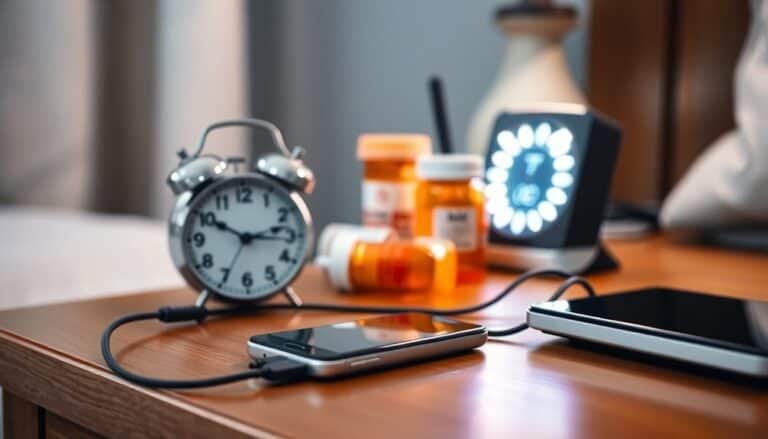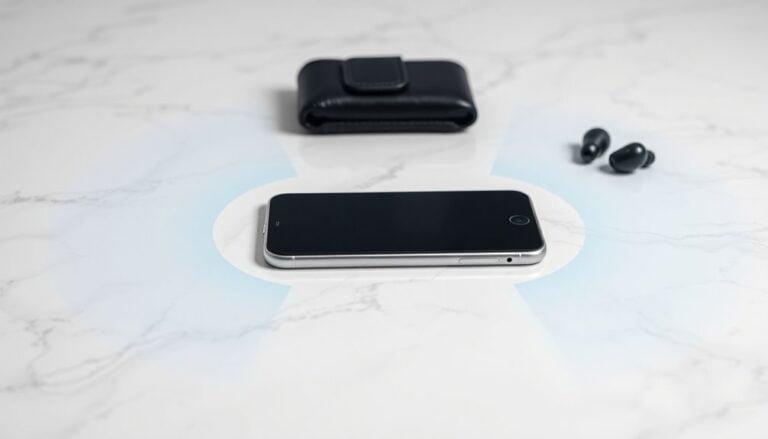Sleeping Safely With Electronics in the Room
Reduce electronics in your bedroom to improve sleep quality, as the blue light from screens can disrupt melatonin production and affect your circadian rhythm. Electromagnetic fields (EMFs) from devices might also disturb your sleep patterns.
Turn off devices at least an hour before bed to create a tech-free environment and establish relaxing bedtime routines. These strategies can enhance your sleep experience and overall health.
Disclaimer: As an affiliate, I may collect a share of sales from the links on this page.
Understanding the Impact of Electronics on Sleep Quality
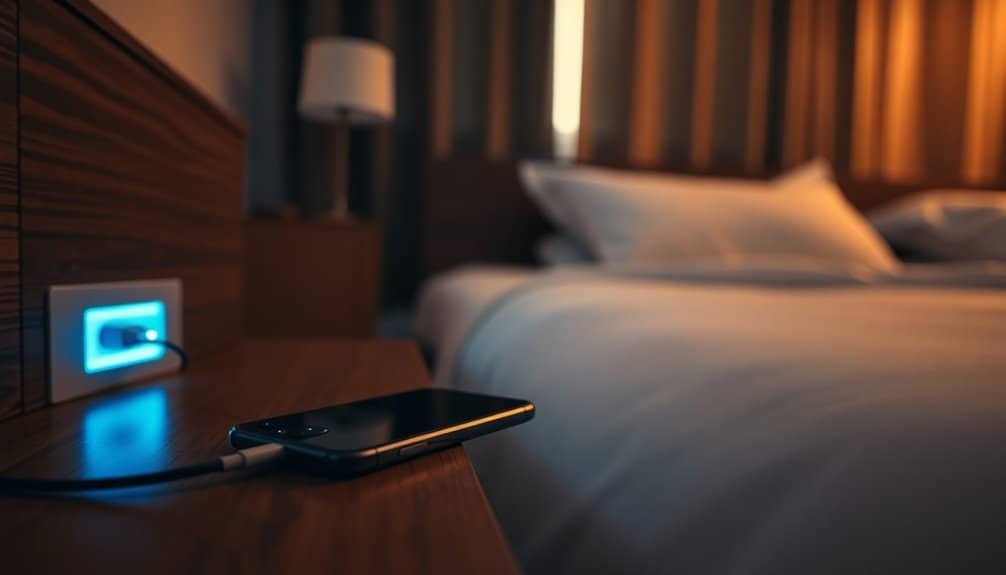
As you engage with electronic devices before bedtime, you may not realize the extent to which they can affect your sleep quality. Regular device use reduces subjective sleep quality due to blue light suppressing melatonin production, disrupting your circadian rhythm. In fact, 48.8% of students reported poor sleep quality due to excessive ED use, highlighting the pervasive impact on young adults. Increased brain activity from screens makes it hard to unwind, while notifications can interrupt your sleep patterns. Studies show that longer device usage correlates with sleep loss and tension. Additionally, emotionally charged content raises arousal levels, further impairing your ability to rest. These factors collectively contribute to declining sleep quality and various health risks, with continuous exposure to WiFi radiation potentially interfering with bodily functions and leading to sleep disturbances.
Prevalence of Device Usage Among University Students
Approximately 81% of university students rely on laptops for academic tasks, making them the primary device in educational settings. Additionally, 56% use smartphones for coursework, reflecting their significant role in academic activities. Students often prefer laptops for complex assignments, while smartphones assist with basic tasks and research. The prevalence of EMF exposure can pose risks to students, particularly during extensive study sessions. Digital literacy strongly influences academic performance, with students struggling with device usage taking longer to graduate. Access to reliable internet and mobile-friendly resources is essential for success. The high prevalence of digital devices also raises concerns about nomophobia, impacting focus and mental health. Students at advanced institutions report higher satisfaction with technology-related services, emphasizing the importance of reliable tools in their educational experience.
The Role of Blue Light in Disrupting Sleep
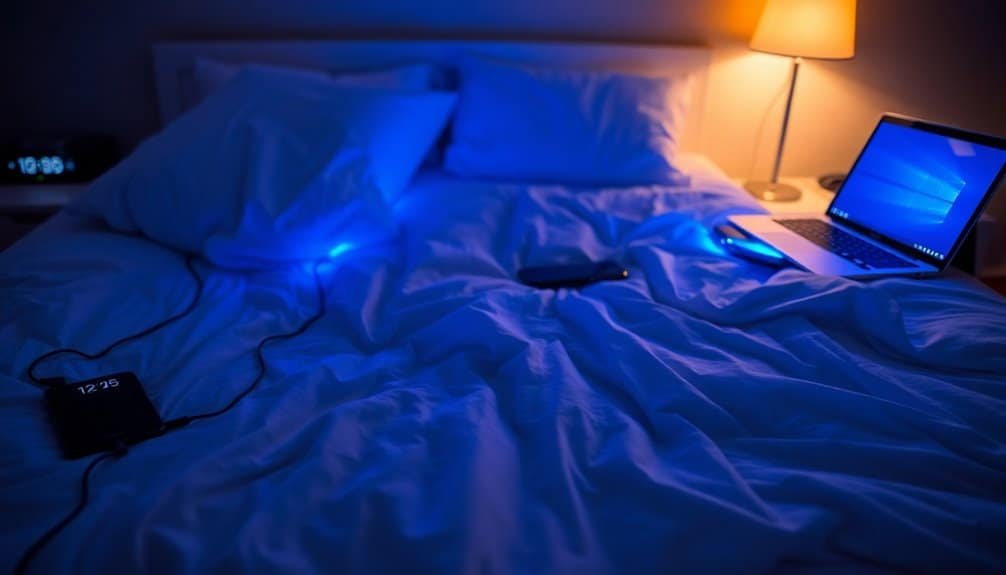
The impact of blue light on sleep patterns raises important questions for anyone using electronic devices.
Exposure to blue light can disrupt your sleep in several ways:
- It suppresses melatonin production, making it harder to fall asleep.
- It disturbs your circadian rhythms by stimulating light-sensitive ganglion cells, affecting your internal clock.
- Studies show that blue light exposure correlates with decreased sleep quality and duration, while increased usage of electronic devices contributes to this issue.
Minimizing blue light exposure before bedtime is essential.
The Effects of EMFs on Sleep Patterns
Electromagnetic fields (EMFs) from electronic devices are increasingly present in our daily lives, raising concerns about their potential effects on sleep.
Research indicates that while everyday exposure to RF-EMFs mightn’t greatly disrupt sleep quality, specific conditions can lead to altered sleep patterns. Proximity to devices, especially at night, plays a vital role in these outcomes.
Additionally, static and pulsating EMFs can influence EEG architecture, affecting sleep. Environmental factors, like device presence in the bedroom, can further impact sleep quality. Prolonged exposure to EMF radiation during sleep is not advisable, as it may lead to insomnia and other health issues.
Common Symptoms Associated With Bedtime Device Use
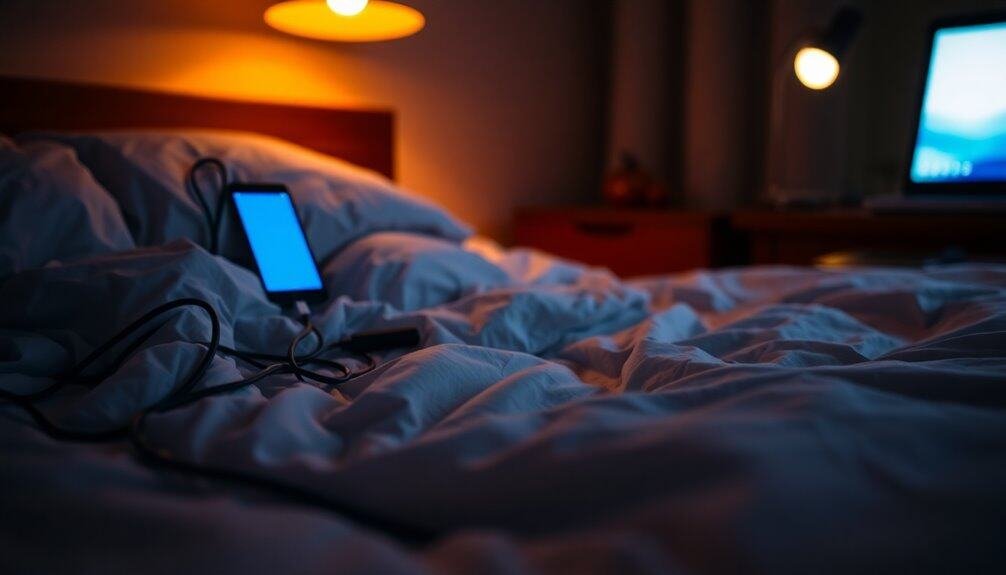
Using electronic devices before bed often leads to a range of common symptoms that can considerably affect your sleep quality.
You may experience:
- Reduced Sleep Duration: Screen time often shortens overall sleep time.
- Sleep Onset Delay: It might take longer to fall asleep due to overstimulation.
- Physical Discomfort: Symptoms like headaches, eye strain, and muscle tension may arise.
These symptoms disrupt natural circadian rhythms, altering your sleep-wake cycle.
Consequently, the combination of blue light exposure and engaging content can hinder your ability to relax, leading to poorer sleep quality and increased daily fatigue.
Mental Health Implications of Poor Sleep Quality
Poor sleep quality greatly impacts mental health, often leading to a cascade of adverse effects.
Sleep deprivation elevates anxiety levels and increases overall distress. Inadequate sleep directly correlates with frequent mental distress, reducing your ability to regulate emotions.
This vulnerability magnifies the risk of depression and amplifies psychiatric symptoms in individuals with existing conditions. You may experience mood changes, irritability, and decreased motivation due to insufficient sleep.
Studies show that sleep disturbances often coincide with poor mental health ratings. As stress levels rise, sleep quality declines, creating a feedback loop that deteriorates both mental health and sleep efficacy.
Recommendations for Reducing Device Use Before Sleep
To enhance sleep quality, it’s essential to minimize device use before bedtime.
Implementing these strategies can greatly improve your rest:
- Set a technology curfew: Stop using devices at least one hour before sleep to help your body wind down.
- Limit stimulating content: Avoid engaging activities like social media or games that keep your brain active.
- Opt for alternative relaxation: Replace screen time with non-digital activities, such as reading or meditation, to signal your body to prepare for sleep.
Creating a Technology-Free Sleep Environment
Creating a Technology-Free Sleep Environment****
Since a well-designed sleep environment greatly impacts your overall rest quality, establishing a technology-free bedroom is essential. Start by removing non-essential devices, like TVs and tablets, which reduce distractions. This promotes an association between your bedroom and sleep.
Aim to turn off devices at least an hour before bedtime to limit blue light exposure, ensuring improved sleep quality. Consider alternatives, such as reading or meditation, to fill pre-sleep time.
Regularly evaluate your sleep quality, adjusting boundaries around device use as needed. Ultimately, a tech-free space enhances intimacy, fosters communication, and supports mental well-being.
Implementing Calming Bedtime Routines
Establishing a calming bedtime routine can greatly enhance your sleep quality.
Implement the following key strategies for effective routines:
- Engage in Quiet Activities: Choose 4–7 calming activities, such as reading, to help you wind down.
- Maintain Consistent Timing: Go to bed at the same time each night to regulate your body’s internal clock.
- Promote Emotional Regulation: Incorporate practices that reduce anxiety, which can lead to improved sleep onset.
Long-Term Health Risks of Sleep Disruption From Electronics
Sleep disruption from electronic devices poses significant long-term health risks that shouldn’t be overlooked.
Electronic devices emit blue light, which suppresses melatonin, making it tough for you to fall asleep. This results in altered circadian rhythms and delayed sleep onset.
Chronic sleep disruption affects your sleep architecture, reducing REM sleep and overall duration. Health risks, like increased cardiovascular disease, diabetes, and mental health issues, arise from consistently poor sleep quality.
Additionally, excessive daytime sleepiness affects your cognitive function. Overall, limiting electronic device use before bedtime is essential for maintaining long-term physical and mental health.
Frequently Asked Questions
Can Using Devices in Bed Affect Memory Retention?
Yes, using devices in bed can greatly affect your memory retention. The blue light suppresses melatonin, disrupts sleep, and increases pre-sleep arousal, ultimately impairing your ability to consolidate and recall information effectively.
How Do Sleep Rings or Trackers Impact Sleep Quality?
Using sleep trackers, like the Oura Ring, can enhance your awareness of sleep quality, with studies showing they improve detection accuracy by up to 20%. However, increased awareness might also lead to anxiety affecting your sleep.
Are Some Electronic Devices Worse for Sleep Than Others?
Yes, some electronic devices are worse for sleep than others. Screens emit blue light, which disrupts melatonin production and sleep quality. Non-screen devices are less harmful, but still contribute to a stimulating sleep environment.
Can Background Noise From Devices Disrupt Sleep Patterns?
When it rains, it pours. Background noise from devices can disrupt your sleep patterns, particularly if you’re sensitive to sound. Experimenting with white noise might help create a more soothing environment for a restful night’s sleep.
Does Using “Do Not Disturb” Mode Help Sleep Quality?
Using “Do Not Disturb” mode definitely helps your sleep quality. It minimizes interruptions from notifications, creating a quieter environment that supports deeper, more restorative sleep, and encourages you to stick to a consistent sleep routine.
Conclusion
Managing electronic device usage before bedtime can significantly improve sleep quality. Reducing exposure to blue light and electromagnetic fields enhances melatonin production for restful sleep.
Creating a technology-free sleep environment and establishing calming routines fosters a healing atmosphere, promoting restorative rest. Prioritizing sleep hygiene not only benefits immediate well-being but also protects long-term health by reducing the risks of chronic sleep disruptions.

